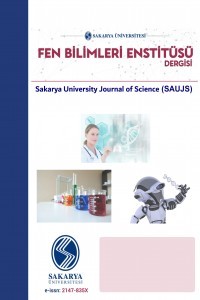The Potential of the Karaman Wastewater Treatment Plant to Generate Electricity with MHP and Reduction of Electricity Bill Amounts by Adjusting Working Hours of the Facility
The Potential of the Karaman Wastewater Treatment Plant to Generate Electricity with MHP and Reduction of Electricity Bill Amounts by Adjusting Working Hours of the Facility
___
- [1] https://www.enerji.gov.tr/tr-TR/Sayfalar/Elektrik [Accessed-12-Jan- 2020]
- [2] https://www.enerjiatlasi.com/hidroelektrik/ [Accessed-14-Jan- 2020]
- [3] http://iklim.cob.gov.tr/iklim/Files/ Mevzuat/kyoto_protokol.pdf [Accessed-14-Jan-2020]
- [4] https://www.haberturk.com/seragazi-emisyonlari-2429941-ekonomi [Accessed-15-Jan- 2020]
- [5] Çoban,O.,Şahbaz Kılınç,N., Yenilenebilir Enerji Tüketimi Ve Karbon Emisyonu İlişkisi: Tr Örneği- Sosyal Bilimler Enstitüsü Dergisi Sayı:38 Yıl: 2015/1 (195-208 s.)
- [6] Resmi Gazete (31.12.2004 tarih ve 25687 sayılı). Su Kirliliği Kontrolü Yönetmeliği
- [7] Samsunlu, A.(2011). Atık suların arıtılması. Birsen Yayınevi
- [8] Özcan,E.(2014).Türkiye kıyılarında yüzme suyu profillerinin belirlenmesi ve turizmde atıksu yönetimi https://webdosya.csb.gov.tr/db/tay/webmenu/webmenu13378.pdf [Accessed-04-Jan- 2020]
- [9] Öztürk,İ.(2017).Atık su mühendisliği. Teknik Kitaplar Serisi(İSKİ) http://www.iski.gov.tr/web/assets/SayfalarDocs/e-kutuphane/kultur/docs/at%C4%B1ksu-m%C3%BChendisli%C4%9Fi.pdf [Accessed-12-Jan- 2020]
- [10] Tüik(2018).Belediye atık su istatistikleri. http://www.tuik.gov.tr. [Accessed-09-Jan- 2020]
- [11] Venkatesh, G. & Brattebø, H. (2011). Energy consumption, costs and environmental impacts for urban water cycle services: case study of Oslo (Norway). Energy 36(2), 792–800.
- [12] Kwok, S. C., Lang, H., O’Callaghan, P. & Stiff, M. (2010). Water Technology Markets 2010 : Key Opportunities and Emerging Trends. Media Analytics Ltd, Oxford.
- [13] http://www.emo.org.tr/ekler/38a62084dd5b1ff_ek.pdf .[Accessed-12-Jan- 2020]
- [14] https://www.tarimorman.gov.tr/SYGM/Belgeler/ar%C4%B1tma%20norm%20rehberi/AAT%20Tasar%C4%B1m%20 Rehberi%20(1).pdf [Accessed-19-Jan- 2020]
- [15] Resmi Gazete(12.05.2019 tarih ve 30772 sayılı). Elektrik Piyasasında Lisanssız Elektrik Üretim Yönetmeliği
- [16] Williams, A. A. (1996). Pumps as Turbines for Low Cost Micro Hydro Power. World Renewable Energy Congress, Denver,USA.
- [17] Williams, A. A., Smith, N. P. A., Bird, C. & Howard, M. (1998). Pumps as turbines and induction motors as generators for energy recovery in water supply systems. Journal of the Chartered Institute of Water and Environmental Management 12, 175–178.
- [18] Mikus, K. (1984). Erfahrungen mit Kreiselpumpenanlagen zur Energieruckgewinnung aus dem Trinkwassersystem. Das Gasund Wasserfach – Wasser/Abwasser 124(4), 159–163.
- [19] Erkan,D.,Yılmaz,T.,Yücel,A.,Yılmaz, A.,Tel,A. & Uçar,D.(2018). Atıksu Arıtma Tesislerinde Enerji Kazanımı için Mikro Ölçekte Hidroelektrik Santrallerin Uygulanabilirliği. HU J. of Eng. 02 (2018) p.1-6
- [20] Engineering & Technology Magazine (2010). Power generation by Archimedes screw.
- [21] https://www.hurriyet.com.tr/gaski-atik-su-ile-enerji-uretecek-40215041 [Accessed-18-Jan- 2020]
- [22] http://www.yekenergy.com/referanslar/aski-arsimet-burgulu-elektrik-uretim-santrali/ [Accessed-28-Jan- 2020]
- [23] McNabola, A., Williams, A. P. & Coughlan, P. (2013). Energy recovery in water supply networks: an assessment of the potential of micro hydropower. Water and Environment Journal 27, 435–436.
- [24] Engelhardt, M. O., Skipworth, P. J., Savic, D. A., Saul, A. J. & Walters, G. A. (2000). Rehabilitation strategies for water distribution networks – a literature review with a UK perspective. Urban Water 2(2), 153–170.
- [25] Giugni, M., Fontana, N. & Portolano, D. (2009). Energy Savings policy in water distribution networks. Proceedings of the International Conference on Renewable Energies & Power Quality, Valencia, Spain.
- [26] http://www.mneproje.com/public/website/news/atiksu-aritma-hes_20200131070151.pdf-[Accessed-22-Jan-2020]
- [27] Gaius-obaseki, T. (2010). Hydropower opportunities in the water industry. International Journal of Environmental Sciences 1(3), 392–402.
- [28] Resmi Gazete (01.10.2010 tarih ve 27716 sayılı).Çevre Kanununun 29. Maddesi Uyarınca Atık Su Arıtma Tesislerinin Teşvik Tedbirlerinden Faydalanmasında Uyulacak Usul Ve Esaslara Dair Yönetmelik
- Yayın Aralığı: Yılda 6 Sayı
- Başlangıç: 1997
- Yayıncı: Sakarya Üniversitesi
The Effect of Different Parameters on Shape Memory Alloys
Ibrahim Nazem QADER, Mediha KÖK, Fethi DAĞDELEN, Shakhawan Salih ABDULLAH
Classification of Breast Cancer Images Using Ensembles of Transfer Learning
Tuğba GÜNGÖR ERTUĞRAL, Cemil ALKAN
Real-Time Obstacle Avoidance Based on Floor Detection for Mobile Robots
Microcontroller-based Random Number Generator Implementation by Using Discrete Chaotic Maps
Gülçin ERSÖZ DEMİR, İbrahim YÜCEDAĞ
